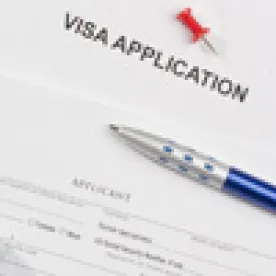News outlet Reuters has reported that during the first month of Travel Ban 3.0, 8,400 individuals from Chad, Iran, Libya, North Korea, Syria, Somalia, Yemen, and Venezuela applied for visas, while only an estimated 100 waivers were granted.
Individuals from Chad, Iran, Libya, North Korea, Syria, Somalia, Yemen, and Venezuela are affected by Travel Ban 3.0. Certain individuals are exempt from the travel restrictions, including those with valid entry documents, U.S. legal permanent residents, and dual nationals.
Concerned, Senators Chris Van Hollen (D-MD) and Jeff Flake (R-AZ) requested information from the State Department regarding the waiver process following information received reporting “the near uniform denial of waivers of visas.” In response, the State Department outlined its waiver process.
If an exemption does not apply to the traveler, a Consular Officer must consider the following to determine whether a waiver might be appropriate in order to grant entry to the U.S.:
- Is there undue hardship?
- An unusual situation exists that compels immediate travel, and delay would defeat the purpose of the travel.
- Is there a national interest?
- A U.S. person or entity would suffer hardship if the applicant could not travel until after restrictions are lifted.
- Does the applicant pose a threat to national security or public safety?
- This includes a consideration of the information-sharing and identity management protocols of the individual’s country of nationality.
There are no categorical or blanket waivers, but Travel Ban 3.0 provides specific examples where a waiver might be appropriate in Section 3(c)(iv), assuming the above standards are also met. Examples include the following:
-
- Applicant has previously been admitted for work, study, or other long-term activity and plans to continue that activity.
- Applicant previously established significant contacts with the U.S. for work, study, or other lawful activity.
- Applicant seeks to enter the U.S. for significant business or professional obligations and denial of entry would impair those obligations.
- Applicant seeks to enter the U.S. to visit or reside with a close family member (e.g., spouse, parent, or child).
- Applicant is an infant, young child, or adoptee, or an individual needing urgent medical care.
- Applicant has been employed by the U.S. government.
- Applicant is traveling for purposes related to an international organization.
- Applicant is a Canadian permanent resident who applies for visa in Canada.
- Applicant is traveling as a U.S. government-sponsored exchange visitor.
- Applicant is traveling at the request of a U.S. governmental department or agency for law enforcement, foreign policy, or national security purposes.
When being considered for a waiver, individuals may be asked to provide additional personal information. While there is no specific waiver application, individuals are encouraged to submit information to show they qualify for an exemption or waiver. The waiver adjudication may take additional time to process.
In the meantime, the U.S. Supreme Court has agreed to hear a case challenging the validity of Travel Ban 3.0 this spring.




 />i
/>i
